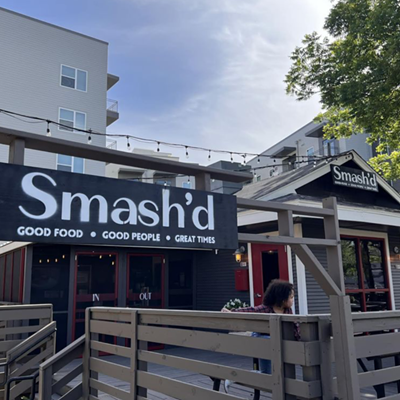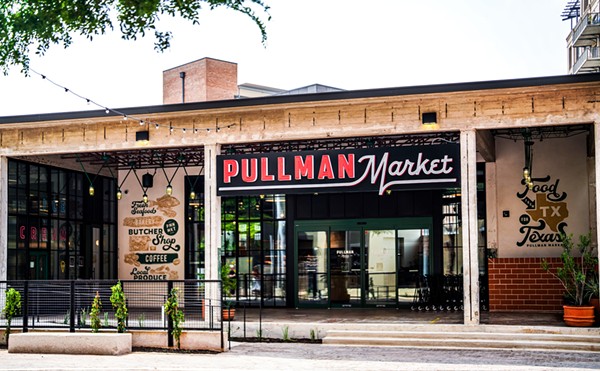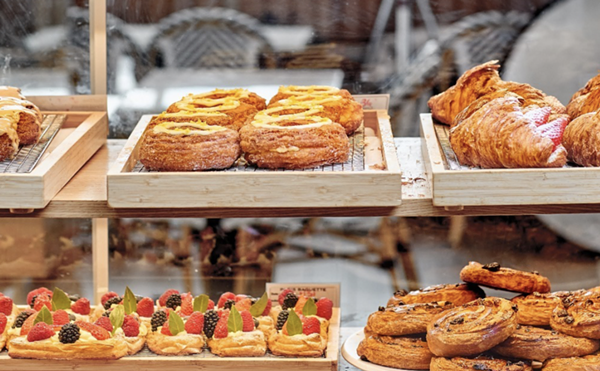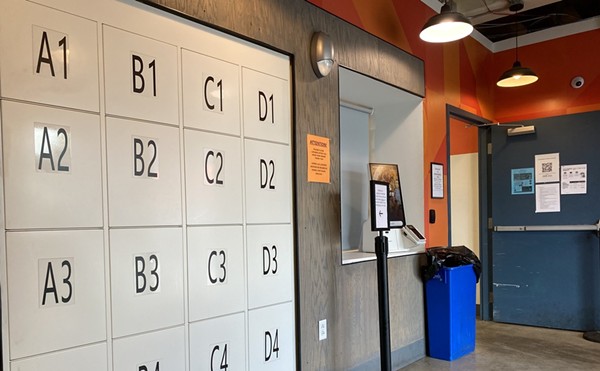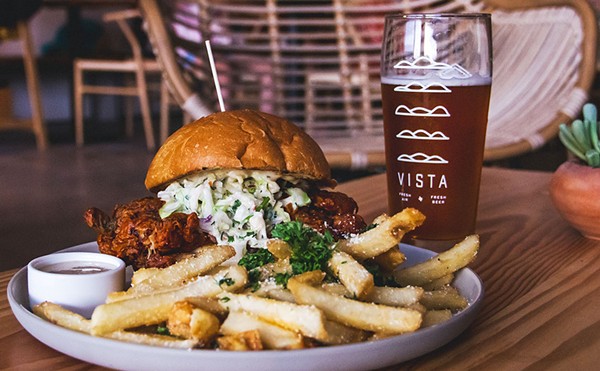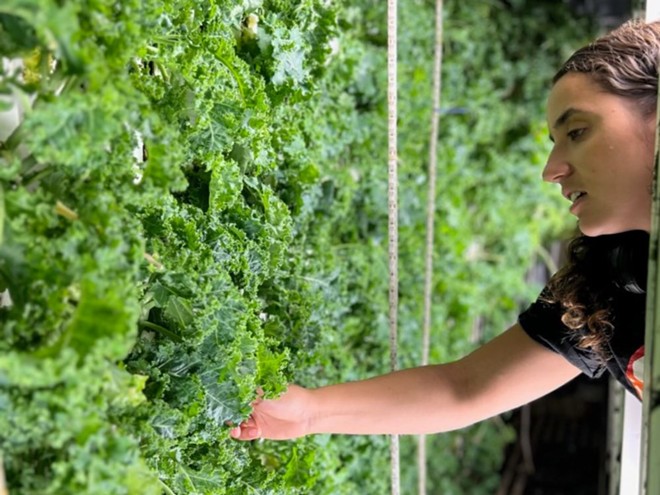
When someone says "urban farming," it's unlikely the image of San Antonio's LocalSprout Food Hub springs to mind.
With its chilly, LED-lit interior and steady mechanical hum, the hydroponic-powered shipping container garden looks and sounds more like a spacecraft than a growing operation. An occasional tick sounds as a bug zapper claims another winged victim.
"These spiders really need to get to work," LocalSprout Food Hub Manager Jess Rivera joked as a gnat hovered incessantly around her head.
LocalSprout celebrates 10 years in business this year — a worthy feat for any small, cutting-edge venture. However, it's done more than survive. It's thrived — and so have the ideas its operators have planted in the larger community.
LocalSprout has built a booming culinary community by preaching a gospel of entrepreneurial spirit, sustainable living and urban agriculture via its Eastside Food Hub.
Not bad for a project launched by a freshly graduated Trinity University student in 2013.
LocalSprout Founder and CEO Mitch Hagney is also the San Antonio Food Bank's director of food sustainability and chairs the Urban Agriculture Workgroup for the City of San Antonio's Food Policy Council.
His decade of business experience in soilless hydroponic farming, along with his community leadership in food and nutrition policy, have laid the groundwork for partnerships with other sustainably-minded, small local businesses.
"At a basic level, the role that LocalSprout plays is to help grow small businesses in a culinary and sustainability context — in a way that helps those ventures actually become sustainable lifestyles," Hagney said. "A lot of people, they come to the Hub with a side hustle, or they just left a job and want to give something a shot. At 10 years old, I think we're an institution. And we want to continue to provide services that culinary entrepreneurs can use to launch their dreams."
Selling to the public
LocalSprout's Eastside Food Hub provides 16,000 square feet of shared space where more than 20 active companies can access large walk-in coolers and freezers, prep kitchens, food-truck commissary space and urban farming infrastructure. Powered by a rooftop solar array, the co-working facility will soon see another benchmark of growth: its foray into the retail space.
Later this fall, longtime tenant Pulp Coffee Roasters will anchor the retail endeavor at 503 Chestnut St., giving the public direct access to its specialty private label Joe and other products produced by hub tenants. These include pickles, kimchi and sauerkraut from Madge's Food Co., chili fixings and enchilada sauces from JD's Chili Co. and protein from free-range heritage hog ranch Peaceful Pork, to name a few.
Food Hub Manager Rivera was first introduced to urban agriculture while cooking at San Antonio dining spots including Southerleigh Fine Food & Brewery and long-since-shuttered Alchemy Kombucha and Culture. Her work at farm-to-table eateries fulfilled her creative side, but when she was furloughed at the onset of the COVID-19 pandemic, Rivera was relieved.
"It's been great to get out of the kitchen. It's like after I turned 30, my body was over it," she joked. "When the pandemic happened, I'd been at Southerleigh for three years, and I'd just hit a wall. I have to say I was pretty stoked to be furloughed, and so we took off and did our own thing."
Like plenty of foodservice pros who lost jobs during the pandemic, Rivera and her fiancée launched and operated a heart project — a delivery charcuterie outfit called Cafecito, which operated out of LocalSprout's Hub. Along with cured meats, Cafecito's charcuterie packages included scratch-made preserves, crackers, pickles and sweets.
At the time, LocalSprout CEO Hagney had begun working more closely with the Food Bank and larger organizations outside the company, so he offered Rivera a job overseeing its day-to-day operations. With wedding expenses on the horizon, she pressed pause on Cafecito and dedicated herself full-time to LocalSprout.
Figuring out the nuts and bolts
Rivera now oversees operations at the Food Hub, including scheduling, tenant relations, garden design and general handiwork. The position helped her hone her fixer-upper skills, from plumbing to troubleshooting electrical systems to installing a heavy rolling service door on the property.
"She's not a mechanical engineer or welder, you know, but [the rolling door] was something the space needed to become more functional," Hagney said. "I bought it, we looked at it, she figured out the nuts and bolts. She doesn't have to build a lot of doors, but she built that one, and when it breaks, she knows how to fix it. That's the creative problem-solver in her. I'm so grateful to have her there."
Rivera's duties also include cultivating lettuces and herbs and harvesting LocalSprout's impressive haul of tender kale. Housed in a climate-controlled shipping container within the Food Hub, LocalSprout's soilless system is rigged with energy-efficient LED grow-lights and a lifeline of water and nutrients, offering Rivera an acute level of control over the plants.
The elaborate hydroponic system allows her to reliably anticipate the yield, which is sold directly to consumers via the LocalSprout website and also to local restaurants including James Beard Award finalist Steve McHugh's Cured and John and Jessica Philpot's Extra Fine bakery.
Cultivating urban agriculture
With Rivera at the helm of LocalSprout's day-to-day operations, Hagney has more free time to devote to researching effective urban agriculture, including forging partnerships with outside experts.
One such relationship is with Stanford University's Natural Capital Project, or NatCap. The program strives to make valuing natural capital — that is, resources such as soil, air, water and living organisms — easier and more accessible to the general public.
Earlier this year, NatCap worked with the Food Policy Council of San Antonio and three city departments to quantify the benefits of urban agriculture here. Armed with data from the study, the stakeholders hope to inform future decisions about urban agriculture investments at a local level in the Alamo City and beyond.
Using state-of-the-art modeling to map the projected benefits of urban farming, the report's authors — which included Hagney — determined that devoting even a fraction of San Antonio's underutilized public land to farming would yield significant net gains for the community.
Using San Antonio as a pilot, NatCap now plans to use funding from NASA's Environmental Equity and Justice program to develop an online tool that will let urban planners use its models to explore development scenarios for expanding urban farming. Theoretically, the tool will allow municipalities to think through a variety of scenarios to help neighborhoods that need better access to fresh foods.
On Thursday, Sept. 14, San Antonio City Council signed off on $60,000 in seed funding to develop three urban farms on public land. Further, the city will devote money from its Resiliency, Energy Efficiency, and Sustainability (REES) Program Fund to maintaining food forests in public parks and generating green jobs for agriculturalists in the city.
Work paying off
The creation of those jobs is part of a larger plan to educate communities on the inner workings of sustainable living, no matter their prior experience, according to Hagney.
"If you have the drive to learn the details, not just the big picture, of how your plan can be executed, there are so many resources available," he said. "And they're not just public financing and mentorship programs. It's YouTube and the guy at the help desk at the hardware store. It's asking the grittiest people you know all the questions you have and working it out."
The fruit of Hagney's labor is on display in Tamōx Talōm Community Food Forest, the city's largest urban food forest to date.
After visiting the high-tech growing operation at LocalSprout, the three-acre food forest at the South Side's Padre Park offered a different kind of sensory experience.
Tall grasses, stalks of underripe okra and the leaves of fledgling fig trees rustled in the breeze. The occasional chitter of crickets punctuated the soft murmur, and huge butterflies floated between squash blossoms and burgeoning, marble-sized native figs.
As the plants mature, the three-acre spread will provide free nuts, fruits and vegetables to the surrounding community.
LocalSprout and its partners have spent a decade trying to rewrite the mindset around food and agriculture in San Antonio and the rest of the world. Tamōx Talōm is evidence that their forward thinking and hard work have taken root — not just in the Eastside Food Hub, but for a whole community.
Subscribe to SA Current newsletters.
Follow us: Apple News | Google News | NewsBreak | Reddit | Instagram | Facebook | Twitter| Or sign up for our RSS Feed




